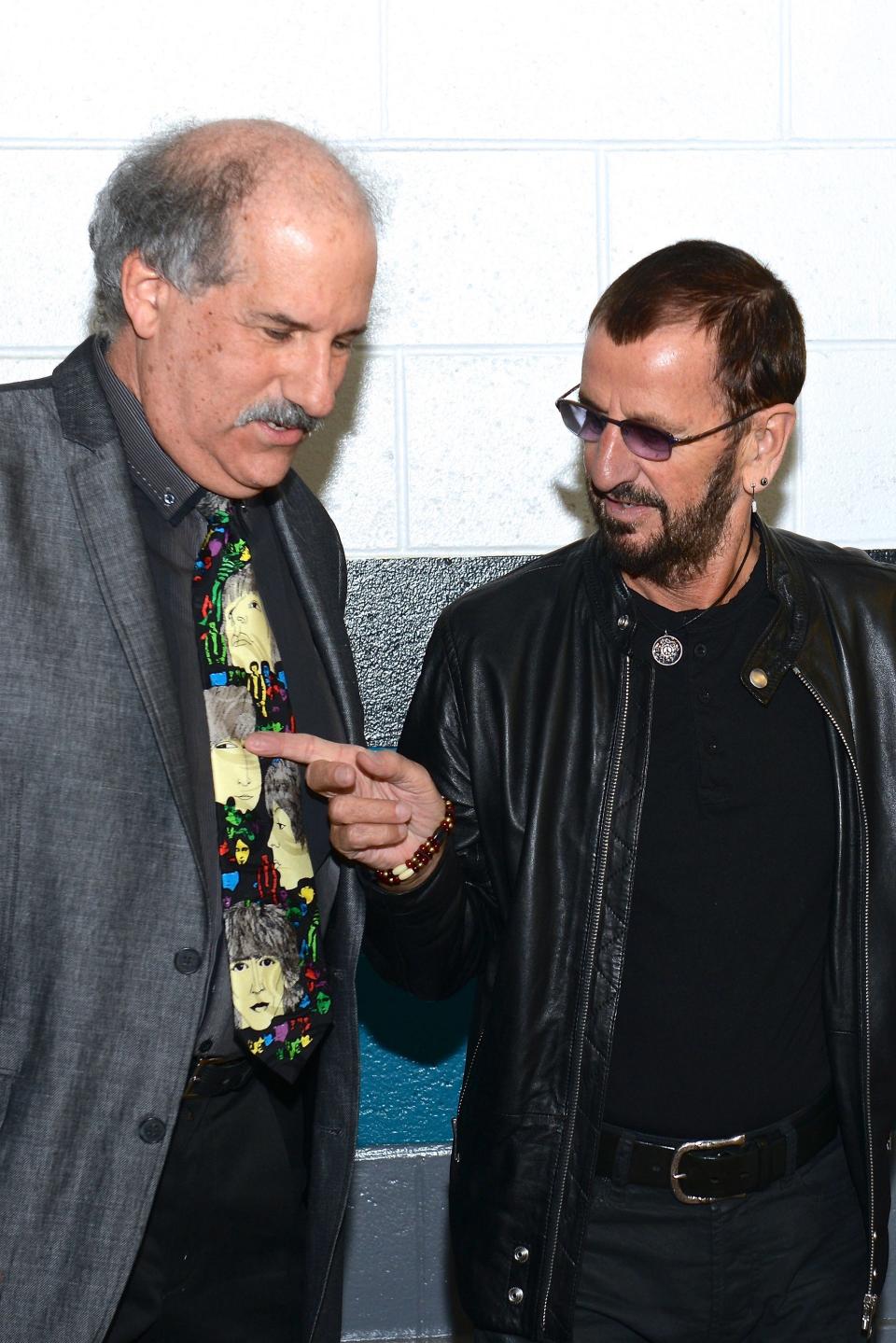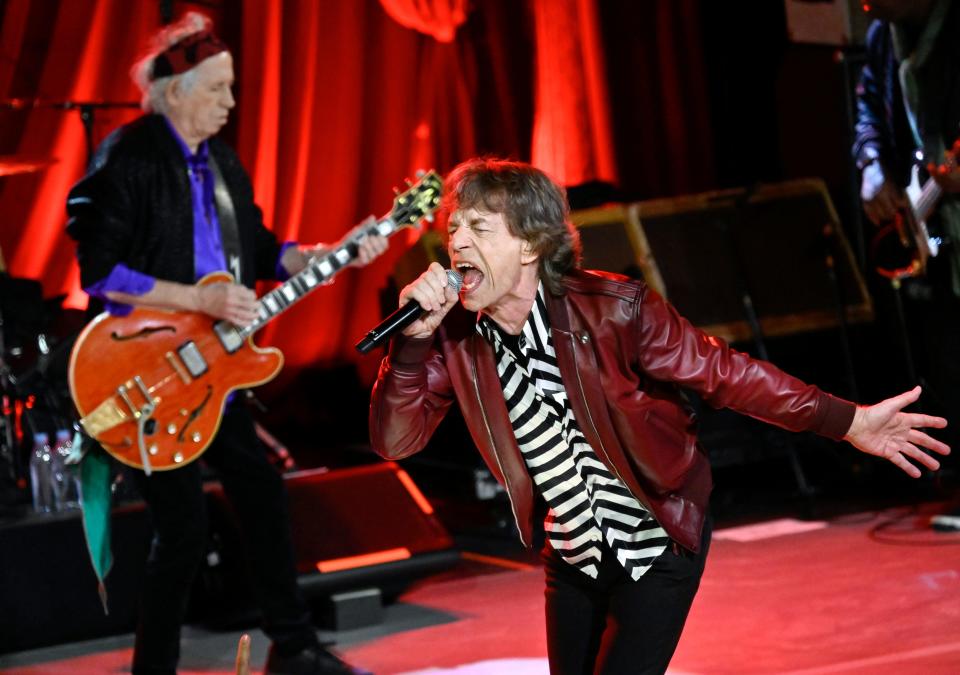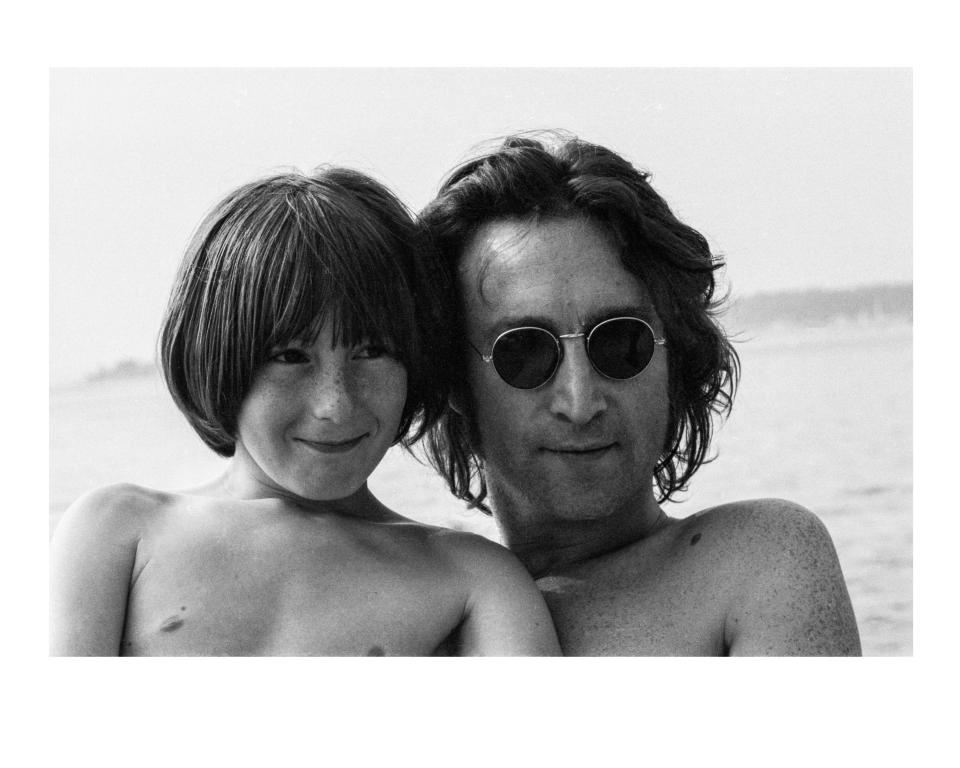First new Beatles song drops Thursday — just after the first new Rolling Stones album
- Oops!Something went wrong.Please try again later.
It's the rematch of the century!
The Beatles and The Rolling Stones! Top contenders for The Greatest Band Ever — and both with new music coming out. Simultaneously. Their first in decades.
Thursday morning at 10 a.m., The Beatles are releasing — a mere 53 years after their breakup — a new song. Almost certainly their last.
And just weeks after The Rolling Stones released their first new songs since 2005 — and also quite possibly their last.
May the best band win!
Beatles fans, for their part, are thrilled that "Now and Then," a tune that the late John Lennon first recorded on mono audiocassette in the 1970s, and that Ringo, Paul and George worked on and abandoned in the 1990s, is finally seeing the light of day this week.
"It's extremely exciting," said Mark Lapidos, the Montvale resident who created the annual Fest For Beatles Fans in 1974.
Magical mystery song
He hasn't heard it — yet. So far, few people have. "A few friends I know who have heard it are absolutely nuts about it," he said.
You'll be able to judge for yourself Thursday morning, when the song drops on SiriusXM satellite radio, on Q104.3 FM New York, and just about anywhere else on the dial, Lapidos said. The unveiling of the last Beatles song, in radio circles, is an Event.

"I can't wait to hear it," Lapidos said. "They've made it a real Beatles song. All four of them are on there."
And that comes on the heels of The Rolling Stones, on Oct. 20, releasing their first album of new material in 18 years.
The Stones roll on
"Hackney Diamonds" actually features The Beatles' Paul McCartney on one song.
It also boasts such luminaries as Lady Gaga, Elton John, Don Was, Stevie Wonder, former Stones bassist Bill Wyman, and — poignantly — Charlie Watts on several tracks (the Stones drummer died in 2021). Reviews of the album have been mostly raves.
"If this is the end, they're going out with a bang," wrote the Guardian.
The timing of the two releases is probably a coincidence, Lapidos said. "But it's very fitting," he said.
Back in the 1960s, the Beatles and The Stones were not just the twin peaks of rock-and-roll. They also represented two different schools, two different worldviews — and many fans felt compelled to take sides.
Team Beatles, or Team Stones?
For Stones fans, the Beatles were too nice. Cheeky, instead of nasty. They had lost touch with rock-and-roll's rebel roots.
By contrast, the Rolling Stones were bad boys. Their music was raw, loud, and aggressive. And that, said their partisans, is what rock-and-roll was all about.

Beatles fans could counter that the Lennon-McCartney songs had a range and variety that the Stones — who stayed very close to their blues origins — couldn't rival. The Beatles developed. The Rolling Stones persisted. As they do, to this day.
"The Beatles were the good guys, and The Rolling Stones were the bad guys, of rock-and-roll." Lapidos said. "[The Stones] were edgier."
It was the difference between "All You Need is Love" and "Sympathy for the Devil." "Let it Be," and "Let it Bleed."
Many people, of course, loved both bands — Lapidos included. With one important caveat: The Beatles were first. "It was the Beatles that led the way," he said.
Against type
The irony was that, in truth, each band was almost exactly the opposite of its image.
Mick Jagger and Keith Richards were middle-class kids from Kent; their band (first called "The Rollin' Stones") originally played for students in West London clubs.
The Beatles came from hardscrabble Liverpool. At least two of them, Ringo Starr and George Harrison, grew up in grinding poverty. Early on, they had a reputation as toughs — John Lennon wasn't above mugging the occasional sailor when he and the boys were gigging in Hamburg.
It was their resourceful manager, Brian Epstein, who cleaned them up, put them in suits, even changed their cigarettes from working-bloke Woodbines to the tonier Senior Service brand.
Tit for tat, the Rolling Stones' manager felt compelled to change their image when the group, formed two years after The Beatles, began to rival them on the charts.
Only instead of cleaning them up, he dirtied them down.
Bad boys
"The Stones were blues fans, but they were middle-class Londoners," Lapidos said.
They needed a new image. And manager Andrew Loog Oldham suppled it.
For starters, he got them out of the suits (they were still wearing them when they made their first appearance on "The Ed Sullivan Show" in 1964) that Epstein had talked The Beatles into.

"He said 'Let's toughen up your image. You can't really compete with The Beatles. You have to do something different,' " Lapidos said.
Whatever their look — and however authentic it was — both bands produced music so compelling that, 60-plus years later, new material from either one is still an occasion.
Were the two bands actual rivals? That's been disputed, over the years. Not too long ago, Paul McCartney called the Stones "a blues cover band." Mick Jagger responded: "The Rolling stones is a big concert band in other decades and other areas when the Beatles never even did an arena tour."
All said with love, Lapidos is certain. "The Beatles gave The Rolling Stones their first hit, 'I Wanna Be Your Man,' " he said. "That’s the song they gave away. They were friends. I've heard interviews for decades. There was no animosity."
One last song
With half a century passed, and both bands having lost key personnel, it certainly seems time to bury the hatchet — if there ever was a hatchet.
In the case of The Beatles, two key members are dead — Lennon (1980) and Harrison (2001). It was only because Lennon left work tapes behind that the remaining Beatles have been able to release an occasional "new" song: "Free as a Bird" and "Real Love" in 1995, and finally this latest, "Now and Then."
All three were made by adding new instruments and voices to the rough tracks that Lennon left. Only in the case of "Now and Then," they were too rough. The song, in 1994, was considered unreleasable. It's only now that technology has caught up with it.
"Paul, George and Ringo were working on the song 'Now and Then,' and George just put the guitar down and said, 'It's no good, it's not working, John's voice is too muffled.' So they all put it down, and stopped working on it."
Now, 25 years later, new technologies (which filmmaker Peter Jackson played a big role in developing) have enabled engineers to isolate and amplify a single sound among many on a mono audio track.
Cleanup on track 1
In the case of "Now and Then," it was John's buried, tinny voice. Thanks to co-producers McCartney and Giles Martin (son of Beatles producer George Martin), it should now come across clear as a bell. "They took the vocals out and it was the equivalent of throwing it in the washing machine, so the voice came out clean," Lapidos said.

The new single is being released on vinyl (four different editions), as part of a CD compilation and — no joke — on cassette.
With Paul and Ringo's new instrumental work, some of the leftover guitar that George added in 1994, and some Martin-esque strings added for good measure, "Now and Then" can be considered a genuine Beatles song.
The very last, Lapidos is certain.
"It's 100% their last song," Lapidos said. "There will never be a new Beatles song where all four of them are on it that hasn't been released."
This article originally appeared on NorthJersey.com: The Beatles new song to drop, after Rolling Stones new album

